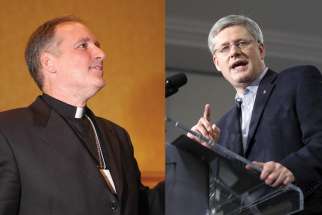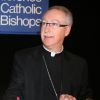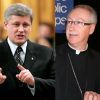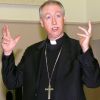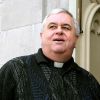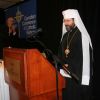Catholic bishops raise concerns, at home and abroad, with PM
OTTAWA - The Canadian Conference of Catholic Bishops has raised concerns about “serious challenges” at home and abroad in an open letter to Prime Minister Harper dated April 17.
CCCB president thanks Pope Benedict for “extraordinary leadership”
OTTAWA - The president of the Canadian Conference of Catholic Bishops thanked Pope Benedict XVI for his “extraordinary leadership” on the day the world found the pontiff would be stepping down from the papacy.
Canadian bishops denounce anti-Semitic talk by SSPX leader
OTTAWA - Canada’s Catholic bishops have denounced recent statements made in Canada by the Society of St. Pius X superior that “the Jews” are the “enemies of the Church.”
CCCB offers blessings to PM, First Nations meeting
OTTAWA - The Canadian Conference of Catholic Bishops wants something substantial to come out of the Jan. 11 meeting between the government and indigenous leaders.
CCCB president sends letter of condolence on Connecticut shootings
OTTAWA - The Canadian Conference of Catholic Bishops president has sent a condolence letter concerning the Dec. 14 school shootings to his American counterpart.
Bishops ‘silent’ on social justice
A “culture of silence” and deference to “political conservatism” has infected the Canadian Conference of Catholic Bishops (CCCB), charges the head of the Jesuit-founded Centre Justice et Foi (Justice and Faith) in Montreal.
In an open letter to CCCB president Archbishop Richard Smith, Elisabeth Garant said the elimination of the CCCB’s post of senior advisor for social justice, delaying and blunting the Canadian Catholic Organization for Development and Peace’s fall education campaign, inviting Immigration and Citizenship Minister Jason Kenney to a private meeting and not criticizing refugee policy reforms amount to a “serious step back away from the rich Church tradition of social justice.”
Garant’s letter will be on the agenda of the next CCCB executive committee meeting Nov. 27-28. Until then, the conference has chosen to make no comment.
Garant served five years as a member of the CCCB’s Commission on Justice and Peace. She accuses the bishops of cozying up to the Conservative government because, she said, the CCCB has not engaged the Canadian government on an issue of social justice since December 2010. At that time, Kenney dismissed a letter from the bishops’ justice and peace commission as another in “a long tradition of ideological bureaucrats who work for the bishops’ conference producing political letters signed by pastors who may not have specialized knowledge in certain areas of policy.”
“From that moment we observe a silence,” said Garant. “Why are we silent on things that are not our personal issues but that we think for the common good we need to talk about?”
She also questions the CCCB for laying off social justice advisor Francois Poitras in order to help get its finances in order.
CCCB General Secretary Msgr. Patrick Powers has said layoffs were necessary. “We have had to rethink the way we do things, to do more and to cost less,” he told Canadian Catholic News.
“When Msgr. Powers said that this responsibility (for social justice) will be spread among other lay people at the conference, I don’t know any of them who have the experience or the competence to deal with social justice,” she said.
Garant also disputes the CCCB’s explanation behind the delay of the Development and Peace fall campaign. In a joint letter, the CCCB and Development and Peace explained that the campaign was delayed and modified because “concern was expressed that elements of the original materials could be a source of division among bishops, priests, parishioners and donors.”
“They are saying they do that for the sake of some faithful who will be hurt,” said Garant. “There’s no real proof of what they are talking about.”
Garant has yet to receive acknowledgment of her letter from the CCCB or Smith. Smith was in Rome in early November.
Though the Centre Justice et Foi has autonomy, it remains a Jesuit apostolate with the full confidence of Canada’s French-speaking Jesuit fathers, said Garant.
CCCB to outsource publishing division
OTTAWA - The Canadian Conference of Catholic Bishops (CCCB) will outsource its in-house publishing division and cut the position of senior advisor on social justice.
“No area of the conference is not affected by the effort to cut down expenses and maximize productivity,” said CCCB General Secretary Msgr. Patrick Powers. “We have had to rethink the way we do things, to do more and to cost less.
“For many y e a r s the bishops have been grappling with finances,” he said. “The dioceses cannot afford to pay the amount of money required to keep the conference running.”
The per capita rate charged each diocese based on Census data of baptized Catholics has remained unchanged this year, but some poorer dioceses are having trouble meeting their assessment, he said.
Powers said he has met with CCCB employees to explain the fact the conference does not have unrestricted funds and must rein in spending “or the bank will close our doors.”
“It’s always so difficult to see people lose their jobs,” he said. “The bishops don’t take that lightly.”
Details of the outsourcing will be revealed later next month after the arrangements are finalized, he said, noting eight to 10 jobs could be affected.
The bishops have been studying the issue of CCCB Publications for 15 years, Powers said. The key, however, was finding a reputable North American company with a reputation for treating its employees well, he said.
“It is a communications firm we have dealt with in the past,” he said.
The position occupied by Francois Poitras, the senior advisor for social justice, has also been eliminated, said Powers. Among his duties, Poitras occupied the position of secretary to the Justice and Peace Commission.
Powers said many aspects of the CCCB secretariat’s operation have needed updating, especially its technological infrastructure.
Development and Peace, bishops continue close collaboration
OTTAWA - During the annual plenary of the Canadian Conference of Catholic Bishops (CCCB) in Ste. Adele, Que., Sept. 24-28, the bishops reaffirmed their ongoing collaboration with their overseas development agency, both respecting its lay-run character and ensuring its Catholic identity.
The lay-run character of the Canadian Catholic Organization for Development and Peace came under fire in recent weeks when its fall education campaign was put on hold after several bishops objected to the campaign for being too political, as first reported in The Catholic Register. The National Post and its sister papers picked up on the story Sept. 26.
The stories saying the bishops intervened, blocked or stopped the fall program are inaccurate, said CCCB president Archbishop Richard Smith in a post-plenary interview from Edmonton Oct. 1.
“The most important thing to emphasize is the bishops are working with D&P on their fall campaign,” said Smith.
The bishops support the principle of D&P’s annual fall educational campaign which raises consciousness about the needs in the developing world “to make people aware of the plight but also the reasons behind it,” he said.
D&P can embark on education programs, but when the strategy includes working through the parishes in local dioceses, “nothing should be taking place without the consent of the local bishop,” he said.
This year’s fall campaign departed from D&P’s plan of focusing on environmental themes to raising questions about Canada’s international aid policies, following substantial reductions in CIDA grants over the next five years. The agency, founded by the bishops more than 40 years ago, was “formulating a campaign as part of a broader movement of development agencies,” Smith said.
“Some of the material was becoming a little more direct political lobbying than we’re accustomed to,” Smith said. Some bishops, Smith included, expressed concern the materials might cause divisiveness in parishes and among donors.
The bishops must ensure “whatever’s done fosters the unity of the Church and is in no way divisive,” he said.
Smith said he spoke to the leadership of D&P about the concerns, which they received graciously, openly and with a “readiness to understand.”
D&P’s leadership “gave some thought to the impact on the life of the Church” of their campaign and told the bishops they would “adjust their literature to reflect their concerns.”
The bishops also heard a report from Toronto Auxiliary Bishop John Boissonneau, from the Liaison Committee composed of D&P leadership and the CCCB’s Standing Committee on Development and Peace, about the progress of documents outlining the principles guiding D&P’s relationship with its overseas partners, contracts with partners, the integration of Pope Benedict XVI’s social justice encyclical Caritas in Veritate into the agency’s work and the training of its staff.
Smith said the documents are “close to final draft stage” and “are still being reviewed.”
In other plenary news, the bishops approved next year’s budget and saw nothing unusual in the present financial pictures of the conference. There will be no hike this year in the per capita rates charged dioceses based on the numbers of Catholics living there.
The bishops also had an off-the-record meeting with Immigration Minister Jason Kenney and that went well, Smith said.
“The conversation was very respectful, open and very frank... It was a welcome opportunity to speak to the minister as a voice for the voiceless,” Smith said. “He certainly did hear us.”
The bishops also marked the upcoming 50th anniversary of the opening of the Second Vatican Council. Smith spoke of how Pope Benedict XVI in his emphasis on the Year of Faith is the clearest voice calling for people to read and understand the documents of the Second Vatican Council so the new evangelization can be based on the beauty of the Catholic faith articulated in them.
Ukrainian bishop warns of subtle spiritual danger of secularism
Ste. Adele, Que. - The Major Archbishop of the Ukrainian Catholic Church told Canada’s bishops Sept. 25 Western secularism challenges Ukraine’s post-Communist future and underlies the worldwide economic crisis.
“The current economic crisis is merely the symptom of a much deeper spiritual and cultural crisis,” Archbishop Sviatoslav Shevchuk told the Canadian Conference of Catholic Bishops’ annual plenary. “As Western society rejects old moral structures and values, it finds that its moral GPS has no fixed and stationary points of reference.”
The first head of the Ukrainian Catholic Church to address the plenary, Shevchuk said the Church must find “new courage” to proclaim the truth of the Gospel to contemporary society to provide “an anchor and compass.”
“We live in societies where virtue and goodness are frequently a veneer for religious intolerance, personal gratification and moral decay,” he said. “Secularism would like us to be closed in a little box of Sunday worship.”
The former Soviet Union used that approach to religion, he said.
“Separation of Church and state has become separation of faith values from society, yet our mission is to preach the Word of God to all, and to be a constant sign of God’s loving presence through social ministry,” he said. “Let us not be afraid of the totalitarianism of political correctness and speak the truth regardless of whom we might offend, whether it is on same-sex marriage or on the genocide of abortion.”
He called to mind the suffering of his Church during the Communist era, that witnessed to Christ both “in the catacombs” as well in in open defiance to the regime.
“So many martyrs and confessors have suffered for the faith in the last century. Let their example and witness be an inspiration for all of us,” Shevchuk said.
The Ukrainian Catholic Church is “experiencing a period of resurrection” in Ukraine, he said.
“Fully embracing its identity of being ‘Orthodox in faith and Catholic in love’ we are aware of our role in allowing the Catholic Church to breathe with both its lungs, East and West,” he said.
Ukraine is experiencing social and economic challenges and has changed dramatically even in five years, he said. The country seems “torn between old influences and new attempts to integrate with the broader European community.”
Contemporary Ukrainian society mistrusts government, politicians and civil institutions, but the Church, especially the Ukrainian Catholic Church, “holds great moral authority.”
“The majority of Ukrainian citizens do not identify with any of the existing Churches, but have a hunger for God and are open to the missionary work of the Church,” he said. “In such circumstances the experience of new evangelization, which we are gradually acquiring, may become a precious treasure, which we would hope to share with the entire Catholic Church.”
The Ukrainian Catholic Church is marking the 100th anniversary of the arrival of her first bishop in Canada. Shevchuk had presided at a Synod of Bishops for the worldwide Ukrainian Catholic Church in Winnipeg the previous week to mark that centennial.
Canadian Conference of Catholic Bishops plenary to examine updated guidelines on clerical sexual abuse
Ste. ADÈLE, Que. - At their annual plenary Sept. 24-28 the Canadian Conference of Catholic Bishops (CCCB) are examining the prevention of clerical sexual abuse as part of its packed five-day agenda.
The 90-plus bishops gathered from across Canada will receive the updated guidelines prepared for submission to the Congregation for the Doctrine of the Faith, conference president Archbishop Richard Smith said in his annual president’s address at the Mont-Gabriel Hotel here Sept. 23.
“Of course our ongoing response must extend far beyond the articulation of protocols and procedures to an embrace in love and compassion of any person, family or community affected by this scourge,” Smith said.
The reflections will also deal with the impact of the clerical sexual abuse crisis on the ministry of priests and how bishops can provide better support. It will also look at the conditions that increase the risk of sexual abuse with an eye to prevention, according to the CCCB program for the week, most of which is closed to visitors and news media.
“How do we foster healing? How do we ensure safe environments? What are the situations that could facilitate boundary violations?” Smith asked, stressing that those in ministry must provide an “unblemished” example.
For the first time, a federal cabinet minister will address the plenary assembly. The off-the-record discussion with Immigration Minister Jason Kenney arose out of suggestion by previous CCCB president Bishop Pierre Morissette that there be more conversation with government representatives, said Smith, now in his second year of a two-year term as president.
“Over the last few years particularly, a number of you have posed questions about Canadian immigration and refugee policies,” Smith said, noting the bishops “as pastors of the Church are to give particular care for refugees and others displaced because of violence and poverty.”
The relationship between Kenney and the bishops has been contentious in the past, with Kenney firing back at a letter from the CCCB’s justice and peace commission critical of anti-human smuggling legislation the commission feared risked harming refugees more than smugglers. Kenney accused the bishops of relying on bureaucrats who “cut-and-pasted” talking points from immigration advocacy groups.
The session with Kenney will also give bishops an opportunity to talk about the difficulties they have with bringing priests in from foreign countries to serve in their dioceses.
The bishops will also reflect on a pastoral response to the suffering caused by the economic downturn.
“We often hear it said that Canada has not been impacted as seriously as other countries,” Smith said. “While that may be true, nevertheless it is of cold comfort to the unemployed or those struggling to find affordable housing.”
Smith used a theme of unity to organize the many initiatives and programs of the CCCB over the past year, noting the mission of bishops is to serve the Church’s unity.
The CCCB adopted a national plan for life and family that is now underway, that is another sign of unity “in our witness to the beauty and sanctity of life,” he said, noting respect for life continues to erode in Western society.
“Every society needs the assurance its caregivers can be entrusted with the lives of its vulnerable members — those in the womb, children, the elderly, the handicapped and the infirm,” he said. “The grave crimes of abortion, euthanasia and assisted-suicide seriously undermine that trust. These are real threats not only to the individual but also to the common good.”
The bishops are summoned to find ways to “reinforce the central ideals of Christian family life, and to celebrate the love and nurturing that many families today achieve despite difficulties,” he said. Smith said the CCCB would be calling on diocesan life and family offices as well as the Catholic Organization for Life and Family (COLF) for help in this endeavour.
The meetings on the Canadian Catholic Organization for Development and Peace have an hour dedicated to reports by the bishops on the agency's board and from the Standing Committee for Development and Peace.
Canadian bishops’ plenary Sept. 24-28 marks historic events
OTTAWA - The Canadian Conference of Catholic Bishops’ (CCCB) annual plenary Sept. 24-28 in Ste. Adele, Que., will mark many firsts this year, from distinguished guests to reflections on topics as diverse as the Second Vatican Council and the worldwide economic crisis.
The gathering, which is expected to draw 80 bishops from across Canada, comes on the eve of several historic events that will also be addressed: the 50th anniversary of the opening of the Second Vatican Council Oct. 11, the Synod of Bishops on New Evangelization Oct. 7-28 in Rome and the canonization of Kateri Tekakwitha on Oct. 21.
“(The plenary) is always such an important moment in the life of the Canadian Church,” said CCCB general secretary Msgr. Patrick Powers. The CCCB executive and secretariat staff “always look forward to the many, many things that will be decided upon in the course of that meeting.”
Among the highlights of this year’s agenda is the visit of Ukrainian Major Archbishop Sviatoslav Shevchuk who will offer a reflection Sept. 25 after having presided at the worldwide Ukrainian Catholic Church Synod of Bishops in Winnipeg Sept. 9-16. He has made pastoral visits to various cities in Canada over recent months to mark the 100th anniversary of the arrival of the first Ukrainian Catholic Bishop Nyktyta Budka to Canada.
Msgr. Jeffrey Steenson, the new Ordinary for the United States’ Personal Ordinariate of the Chair of St. Peter, will also attend. The Ordinariate was erected in January to provide a home for people from the Anglican tradition who wish to become Catholic while maintaining aspects of Anglican liturgy and patrimony under the Holy Father’s 2008 Apostolic Constitution Anglicanorum coetibus. Toronto Cardinal Thomas Collins, the episcopal delegate for Anglicanorum coetibus in Canada will give a report on progress, Powers said.
Immigration Minister Jason Kenney will also hold an off-the-record discussion with the bishops. Powers said it will be a “give and take” session on a range of concerns, from recent legislation that impacts refugees, to the parish refugee sponsorship programs. Many dioceses have a significant number of foreign priests, Powers said, “so (Kenney) is well-placed to help the bishops understand the various things that are happening.”
The canonization of Kateri Tekakwitha gets prominent billing. Saint-Jean-Longueil Bishop Lionel Gendron, the CCCB co-treasurer who heads a temporary secretariat to co-ordinate events in Canada and in Rome surrounding the canonization, will make a presentation on this significant event to the Church and to native Catholics.
To mark the 50th anniversary of the Second Vatican Council, Laval University theologian Gilles Routhier, who is an expert on the Canadian contribution to Vatican II, will deliver a talk.
The Canadian bishops elected last year as delegates at the Synod on New Evangelization will inform the plenary of the content of their Synod interventions, Powers said.
The bishops will also hold a discussion on the upcoming Year of Faith instituted by Pope Benedict XVI.
The bishops will also hold a dinner for Montreal Cardinal Jean-Claude Turcotte who retired this year as archbishop of Montreal, and Collins, who received his cardinal's red hat last February.
The bishops also have a packed agenda of presentations and reports that happen every year, such as reports from organizations like the Canadian Catholic Organization for Development and Peace, the Canadian Aboriginal Council, the Catholic Organization for Life and Family and other groups. The episcopal commissions will report as will standing committees, such as communications and Development and Peace. The bishops will address fiscal matters and adopt a new budget.
Development and Peace fall campaign is put on hold
The traditional fall education campaign of the Canadian Catholic Organization for Development and Peace is on hold until Oct. 15 while staff and volunteers scramble to come up with less political material that will gain the backing of all of Canada's bishops.
Canadian Conference of Catholic Bishops president Archbishop Richard Smith and general secretary Msgr. Pat Powers informed Development and Peace Sept. 5 that several bishops had objected to the fall campaign and did not want the material distributed in their diocese. It is the first time in the 45-year history of the Catholic development agency that the bishops have intervened to block an education campaign.
Neither the CCCB nor Development and Peace could tell The Catholic Register how many bishops have objected to campaign materials, which have been printed but not yet distributed. Through a spokesperson, Smith declined to be interviewed for this story as "the bishops have not had a chance to discuss the issue."
Bishops on the CCCB's Standing Committee on Development and Peace were not consulted on the move to halt the campaign and have not seen the materials.
"I haven't had it explained to me, so I can't really comment," said Toronto's Bishop John Boissonneau, chair of the committee. "I was aware that the president of the conference sent out a letter, but there's been no follow-up with me directly."
"I kind of feel out in the cold on this," said committee member Bishop Richard Grecco of Charlottetown.
The last time the bishops' committee met was May 31 for a consultation with the Development and Peace liaison committee for relations with the bishops. Meanwhile, work on the fall education campaign had been delayed until June while the organization dealt with major restructuring to accommodate a drastic cut in Canadian International Development Agency funding.
The fall campaign was to have veered off-course from Development and Peace's five-year plan of environmentally themed education campaigns. This campaign, which included postcards addressed to Prime Minister Stephen Harper, was conceived as a national consultation on the direction of Canada's foreign aid policy.
A copy of a Development and Peace postcard addressed to Harper was obtained by The Catholic Register. It asks Harper to "launch a national consultation on the future of Canadian development assistance." The card also urges a "Special Parliamentary Committee to examine the new direction of Canadian assistance."
"The trend in how Canada's foreign aid programs are administered has changed quite dramatically," Development and Peace executive director Michael Casey told The Catholic Register. "The role for civil society organizations like us is becoming less apparent. More of the money is going to multilateral institutions, private sector development.... We wanted to see if a constructive critique of this policy from our perspective could get a hearing."
The campaign did not mention the $35-million cut over five years in CIDA funding to Development and Peace, said Casey, and is not an attempt to revisit the funding decision, he said.
"Concerns were expressed regarding the nature and methodology of the campaign with respect that it could create some divisiveness within the Church community and that perhaps there should be some more consultations within D&P and also with the broader Church," said Ronald Breau, Development and Peace national council president.

Archbishop Smith
- Register file photo
Breau wrote to the Development and Peace membership Sept. 17 to explain the delay.
"We are fully aware that our decision will disappoint many of our active and engaged members," Breau wrote.
While the campaign will be modified, the fall action campaign will remain focussed on Canada's development aid policies. But the national council is heeding Smith's warning that the original campaign would "lead to division among our base, among bishops and among our supporters," Breau wrote.
"The bishops are concerned that ongoing dialogue between the Catholic Church and the Government of Canada on some important, timely and sensitive issues might be compromised by our approach at this time."
Parish Development and Peace leader Greg Kennedy is left wondering what his group will do while it waits for the campaign to launch.
"Traditionally Development and Peace at the parish level operates basically two times a year — one in the fall with the education campaign and then the Share Lent or ShareLife in (the Toronto archdiocese)," said the Jesuit, who is studying for the priesthood and helping out at Our Lady of Lourdes in downtown Toronto. "Without those bookends, really there's not much to do until Lent."
The appearance that the bishops are divided or opposed to Development and Peace has become a challenge for parish groups, said Kennedy. And the idea that the bishops' conference did not inform its own standing committee will be even more confusing.
"The bishops set up these avenues through which both they and Development and Peace would work and all of a sudden that gets over-ridden. That's disturbing," he said. "What's the point of having them if they're not going to be used."
But lobbying the government on policy does not amount to education, said Grecco.
"We can have that dialogue (on Canadian development policy). I just don't think it should be a campaign. That's not what D&P should be about."
Refugee groups want bishops to grill Kenney
TORONTO - When Immigration Minister Jason Kenney walks into a room full of bishops in St. Adéle, Que., Catholic refugee agencies are hoping the minister gets an earful.
Five Catholic immigration and refugee organizations in Toronto have written to the bishops asking that they challenge the minister on changes to Canada’s refugee and immigration laws. Kenney will address the bishops between Sept. 24 and 28 in a private, off-the-record session at the Canadian Conference of Catholic Bishops’ annual plenary meeting.
Romero House, Sanctuary Ministries of Toronto, FCJ Refugee Centre, The Mustard Seed and Becoming Neighbours want the bishops to ask Kenney:
o Why Canada is treating refugees from some countries differently than refugees from other countries?
o Whether it’s fair to rush certain cases through the system before refugees hire a lawyer and prepare a thorough case?
o Why the government is limiting basic health care for refugees?
o Why do so many of Canada’s 200,000 foreign workers have no stable pathway to permanent resident status?
o Why are refugees smuggled into Canada as a group blocked for five years from re-uniting with their families even if they are found to be legitimate refugees?
The CCCB won’t say whether these questions will be asked, but it has the potential to re-open an old feud between the bishops and Kenney. In November 2010 the bishops’ Justice and Peace Commission wrote to Kenney to complain of sections of “The Balanced Refugee Reform Act and the Maritime Transportation Security Act.”
“Many of the clauses of this legislation may contravene international law and Canadian law, and penalize refugees more than the smugglers,” said the CCCB letter, adding that his anti-smuggling bill “risks creating serious obstacles to sponsorship and family reunification.”
Kenney did not welcome the bishops’ criticism, telling Canadian Catholic News Ottawa correspondent Deborah Gyapong the letter reflected a “long tradition of ideological bureaucrats who work for the bishops’ conference producing political letters signed by pastors who may not have specialized knowledge in certain areas of policy.”
Romero House director Sarah Villiger hopes this approach to Kenney through the bishops will draw a warmer response.
“We knew that (Kenney) would be there, personally invited. I think that in itself is a bit of a different tone, as opposed to just writing him a letter,” she said.
In part, the refugee agencies wanted to remind the bishops of their own stand on refugee and immigration issues. The letter quotes the bishops own 2006 pastoral letter “We Are Aliens and Transients Before the Lord, Our God.”
“Openness should be shown to persons of all cultures and origins, no matter their immigration status. Christians are to be among those who refuse to let injustice toward migrants continue, let alone increase,” the bishops wrote.
“We thought it was important that they get the input of people who work on the ground with refugees,” said Villiger.
The organizations also took the opportunity to remind the bishops of the many refugees and immigrants who actually occupy pews on Sunday morning.
“The Canadian Catholic Church has historically been an immigrant Church, and today many of the Catholic faithful are immigrants and refugees who form a vital part of and make a significant contribution to the Church in Canada,” they wrote.
Miller calms conflict within pro-life movement
This article was amended on Sept. 24, 2012 to clarify comments made by Jim Hughes.
OTTAWA - A statement by Vancouver Archbishop Michael Miller that supports Catholics who campaign for “gestational legislation” to limit abortion has helped calm growing tensions within the pro-life movement.
Miller wrote it is “morally licit” for Catholics to support legislation that sets limits on abortion rather than immediately banning it outright. The archbishop’s statement, quickly endorsed by Toronto’s Cardinal Thomas Collins and posted on the Canadian Conference of Catholic Bishops’ (CCCB) web site, urges co-operation in the pro-life movement but stresses: “Co-operation does not always mean unanimity regarding a given strategy; open and civil debate about the wisdom of any specific strategy is healthy.”
Over the past year, support in pro-life circles across Canada has grown for a law that would prohibit abortion at later stages of pregnancy or gestation. Campaign Life Coalition, the national political arm of the movement, however, has remained staunchly opposed as have several other groups that believe incremental legislation of this type will not result in an eventual ban on abortion.
Each side has accused the other of not being Christian or Catholic enough — either for not protecting those babies that might be saved through some restrictions on abortion, or for not sending a strong enough message about the value of all human life from conception.
But Miller said that both positions, for or against gestational legislation, are morally licit.
Miller wrote it is acceptable to support gestational legislation (i.e. legislation that would allow abortion in the early weeks of the unborn child’s development) as an incremental step that would reduce the harms of “an unjust legal regime that permits abortion.” But such law should be regarded “as a step along the way to the eventual full legal protection of the right to life of all unborn human beings.”
“At the same time, it is also morally licit to withhold support for gestational legislation — and other incrementalist legislative strategies intended to limit access to abortion — if, after prudent reflection, one is convinced that it is an unwise legislative strategy,” he said.
The Catholic Organization for Life and Family (COLF), co-sponsored by the CCCB and the Supreme Council of the Knights of Columbus, welcomed Miller’s intervention.
“The division within the pro-life movement is very preoccupying, especially when leaders and members of pro-life groups point at each other and criticize each other’s approach to protecting the unborn,” said COLF director Michele Boulva. “All this hinders our chances of obtaining a law that would protect the most vulnerable of Canadians — its unborn citizens.”
She applauded the bishops’ taking leadership in the pro-life arena.
“As Catholics it is essential that we turn to our bishops when confusion arises regarding the Church’s teaching. Christ has empowered them to teach in His name.”
Based on Blessed John Paul II’s teachings in Evangelium Vitae, “legislation which intends to limit the harm done by a pro-abortion law is not itself co-operation with unjust law but rather ‘a legitimate and proper attempt to limit its evil aspects,’ ” the archbishop wrote.
The absence of any law restricting abortion in Canada is a “de facto legal regime that permits abortion with almost no restrictions,” the archbishop said.
“Legislation intended to restrict access to abortion would not create a new legal situation in Canada which would authorize abortions, but instead would intend to limit the number of abortions already authorized under law,” he said.
He also reiterated Catholic teaching against abortion at any stage, noting that “no law can claim to legitimize abortion.”
Two major pro-life groups on either side of the issue welcomed Miller’s statement.
Campaign Life president Jim Hughes said the archbishop makes it clear we have a de facto law by having no restrictions on abortion.
“I thought Archbishop Miller laid the case pretty well,” he said. "Although I and many others would not necessarily agree with his opinion on a de facto law.”
The most important part of his statement “points out that gestational legislation may or may not be the way to go,” said Hughes, who remains wary of the gestational legislation approach.
Priests for Life Canada is among the many pro-life groups that would support gestational legislation. Priests for Life board chairman Fr. John Lemire, a parish priest based in New Liskeard, Ont., said he is pleased the archbishop’s statement has “supported the idea that a Catholic, a Catholic politician, can in good conscience support gestational legislation.”
The archbishop’s letter may have helped shore up some of the unity within the pro-life movement that has been fragile since its inception, Hughes said. The movement is made up of political, educational and pastoral groups that counsel and support mothers with unexpected pregnancies.
“Campaign Life Coalition has been accused of being ‘all or nothing’ and that’s not true,” Lemire said, noting that since its first questionnaire in 1978, it has “always had an incremental question as part of its strategy.”
The key, said Hughes, is in the wording of any legislation.
“I’m not in favour of ‘we need any law,’ ” Hughes said.
He is opposed to the gestational approach because the experience of countries with gestational laws in place have “so many exceptions” the laws are “virtually useless.” There are many other forms of incremental legislation that would restrict abortion — such as defunding it, or informed consent laws, that Campaign Life would support, he said.
“As the political branch of the pro-life movement we have been battling over 30 years,” he said. Campaign Life has also worked closely with counterparts in other countries who have said “gestational limits are not the way to go.”
Hughes’ objection to gestational legislation extends beyond doctrinal concerns to practical matters, he said. Campaign Life has focused on identifying and supporting individual pro-life candidates in both the Conservative and Liberal parties at the grassroots level. He noted that there are presently 60 pro-life MPs in Parliament. A gestational bill would not have the votes to pass, he said. In addition, Prime Minister Steven Harper remains unwilling to reopen the abortion debate.
Hughes said momentum on the issue has been shifting towards the pro-life movement, but a focus on gestational legislation risks sidetracking it.
The role of the Priests for Life, Lemire said, is to work with all the groups, to “try to be a bridge builder and bring about some dialogue and conversations” not only among groups but with bishops and people in dioceses.
That does not mean Priests for Life agrees with every tactic, he said. But he stressed people who might not be comfortable in an activist role could be great counselling a young expectant mother, or doing any number of tasks that need to be done to create a culture of life.
Canadian bishops throw support behind Motion 312
OTTAWA - The Canadian Conference of Catholic Bishops (CCCB) issued a Sept. 18 statement affirming support for the sacredness of all human life from conception to natural end as Motion 312 comes to its second and final hour of debate in the House of Commons.
Conservative MP Stephen Woodworth's private member's motion would review the Criminal Code's definition of a human being in the homicide section that declares: "a child becomes a human being within the meaning of this Act when it has completely proceeded, in a living state, from the body of its mother."
The statement was signed by CCCB President Archbishop Richard Smith. It is posted on the CCCB web site (www.cccb.ca) and provides a link to Motion 312's text.
"The Catholic Church holds that a human being comes into existence at conception," Smith says in the statement. "The lives of human beings are, therefore, sacred at every stage in our existence — from beginning to natural end.
"As the House of Commons prepares to debate Motion 312, the bishops of Canada invite all members of the Parliament of Canada to take into full account the sacredness of the unborn child and each human life. We also encourage Canadian Catholics, and all people of good will, to pray that our legislators be blessed with wisdom and courage to do what is best to protect and further the common good, which is based on respect for the human dignity of all."

